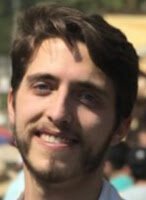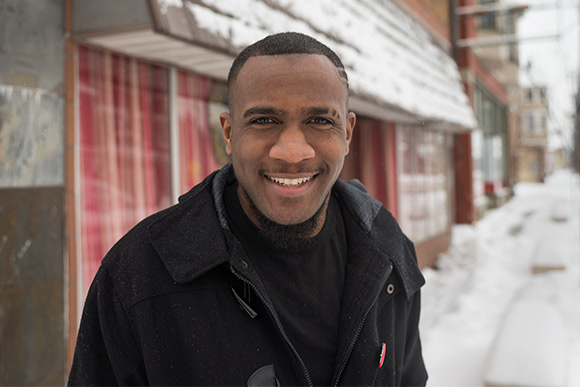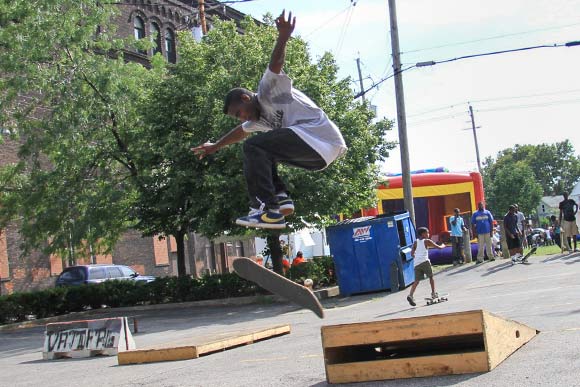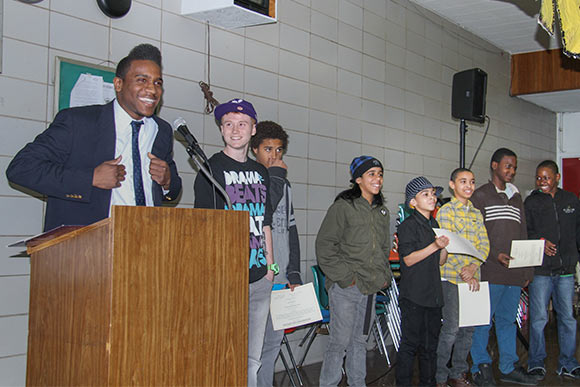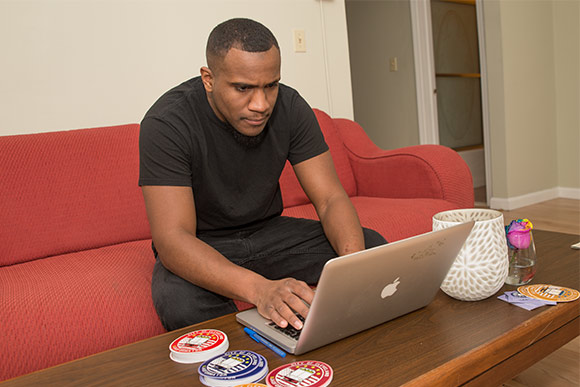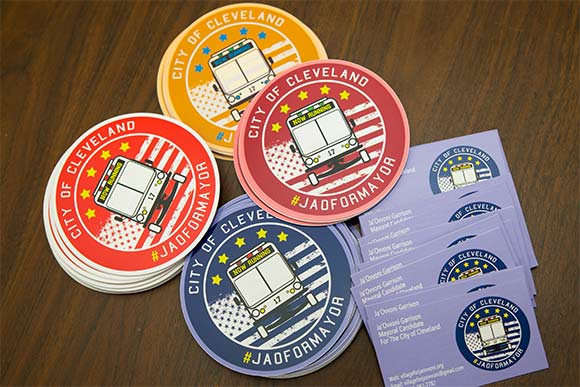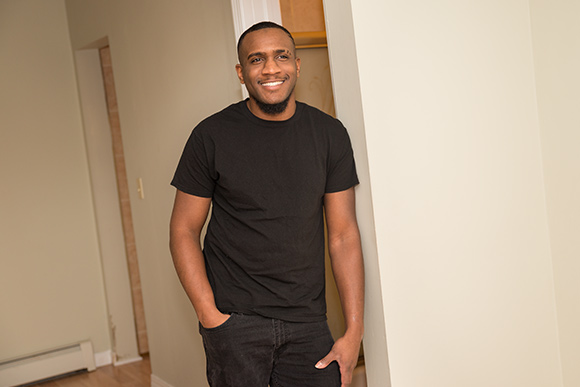Ramping up the odds: an underdog rolls in as candidate for mayor
Skateboarding, the novice quickly learns, all revolves around persistence and form: the position of your stance (goofy? regular?) and the bending of the knees. Going for a three-sixty flip down a ten-stair? Push for speed. Want to do a manual across a plaza parking lot? Careful with the weight on that back heel. Yet every weathered skater—no matter their stripe or upbringing—is sure to instruct, “You’re going to fall a lot. Falling is one of the fundamentals of skateboarding.”
And so says Ja’Ovvoni Garrison.
For nearly a decade, Garrison, a 27-year-old organizer living with his girlfriend in Slavic Village, has both fallen and gotten back up ad infinitum. Besides acting as one of the city’s go-gettingest skateboard liaisons, he's used the catalyst of a somewhat misunderstood sport to propagate a well-to-do career in community organizing, whether it be handing out hundreds of fully-assembled boards to impoverished east side teens or pushing to bring the Flats’ Crooked River Skate Park to fruition—a $790,000 project that was nearly abandoned due to unexpected excavation mishaps.
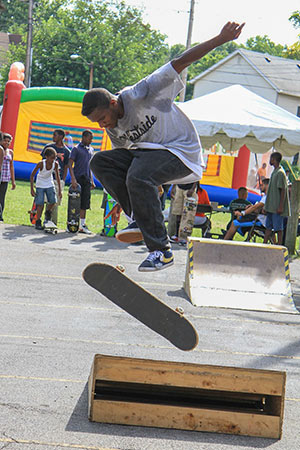 Ja’Ovvoni Garrison
Ja’Ovvoni Garrison
Garrison's community work isn't just about boarding, or as he says, it's “not your traditional sense of organizing.”
Working as a freelancing organizer for eight years, and as a Slavic Village Development (SVD) employee in 2015, Garrison is now a self-made politico, one well versed in development lingo and urban economics. Though Garrison’s gained the esteem of many ward members and community liaisons, witnessing the beautification of the downtown core while East Cleveland continued to languish led the skateboarder to devise his next trick. Shortly after the 2016 election results, Garrison made it official: he would run for Mayor of Cleveland.
Sitting in his Spartan living room in his second floor unit, Garrison, dressed all in black with two razored lines on his temple, explains that there’s no use wasting time on any lesser political seat. Council members are often at the will of City Hall’s sweeping hand, he says, along with the allocation of funds for area community development corporations (CDCs), and their programming. Plain-spoken with a forward hunch, Garrison talks bluntly about his discontent with the Frank Jackson administration—they’re too influenced by local corporatism and the likes of Dan Gilbert. Not once does he mention the names of the seven opponents he’s running against.
“I just need to get into office,” he says. “I could run for council, but knowing the top-down, I’d still be in square one. The whole ecosphere in Cleveland—change could happen now. But everybody knows how difficult it is to do something in this city, whether it’s skateboarding, opening a business. And these people, in their positions, are not doing enough. I just have to try. There’s no thinking about who’s running. About the bad things that could happen. I know who I am. I know what I’m capable of doing. That’s just what I’m going to push.”
A sibling to eight brothers and sisters, Garrison grew up pretty much in constant movement—in the suburbs of East Cleveland to Nashville and southern Florida—until settling back in Slavic Village after realizing that his first love, skateboarding, could be his inroad to community engagement. With a sole high school diploma to show, Garrison’s inclusion in the development world was hard earned. A self-starter, Garrison, then 22, spent months finding a way to provide underprivileged kids with skate parks, until quickly becoming jaded with CDCs: a lot of them found his query “too risky.” After failed phone calls to City Hall, he met organizer and boarding advocate Vince Frantz at a skate contest in Rocky River, who teamed him up with an open-eared member of SVD at the time, Emily Miller. Add to that his successful bid for a grant from Neighborhood Connections to foster his skateboarding drive, and Garrison’s career officially borne.
Since 2008, Garrison estimates he's acted as a mediator and board-supplier for nearly 30 to 40 kids a year.
Though the mayoral candidate has concrete plans if he wins the seat—like providing free RTA rides through a one percent tax increase—and is well-versed in the needs of Cleveland’s neighborhoods (“The rec centers on the east side look like detention centers”), there are people familiar with Garrison’s work that don’t think the 27-year-old is cut to run a city. He has little involvement in actual politics, and has not been to Harvard for law school, like some of his opponents. One associate even believes Garrison is reacting primarily on youthful idealism and aiming way too high politically, comparing his mayoral bid to “like flying a plane without getting your license.”
Others beg to differ.
“I think a piece of paper is a piece of paper,” says Zach Germaniuk, a community liaison at SVD who worked alongside Garrison. “That has nothing to do with life experience. I really think the people in the neighborhoods are waiting for someone like Jay. I mean, does Cleveland really need another giant chandelier, or do we need some streets on East 90th to be paved?”
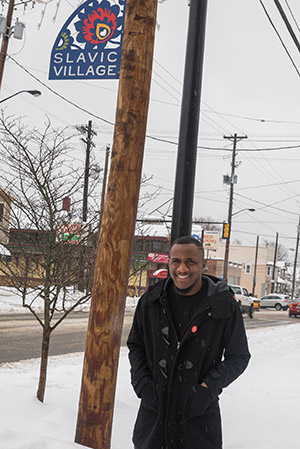 Ja’Ovvoni Garrison
Ja’Ovvoni Garrison
It’s true. Mayoral candidate Jeff Johnson, a star councilman in his twenties until he was rocked by an extortion lawsuit in the 1990s, is more than twice Garrison’s age and has at least two times the experience. He’s also running with a “neighborhood’s first” agenda, one that could, like Garrison’s plans, inject downtrodden neighborhoods with hundreds of thousands to rebuild infrastructure and renew depleted spirits. Still, Garrison shows little, if any, concern over the competition. This is not about them, he says, as do the boxes of the 20,000 campaign stickers festooning his living room, which proclaim, "This one’s for us!"
Tressa Garrison, Ja’ovvoni’s mother who lives down the street from him in Slavic Village, says she’s not surprised that her mover-shaker son is taking a huge career leap (that, for starters, includes asking for $10 million in donations). For Tressa, potential political backlash and ad hominem attacks don't sway her unwavering support.
“I was actually egging him on to do it,” she says. “Because he just works so well with community leaders. Yeah, he’s young, but Jay is knowledgeable. Even if he doesn’t win, he can take this knowledge and work on it again next year.”
Of course, Garrison may lose—or win.
After all, his run isn't unprecedented. Voters in Stockton, California elected 26-year-old Michael Tubbs as their mayor last November and the people of Pittsburgh chose then 26-year-old Luke Ravenstahl to helm the city in 2006. Even Dennis Kucinich was deemed the “boy mayor of Cleveland” when he was elected in 1977 at age 31. Notably, however, all three men had previous city council experience and college degrees prior to their mayoralties.
"I think about myself and these guys," Garrison says. "I just really think the timing is right."
These days, as Garrison's campaign switches into full gear, defeat is a mere ghost, a would-be future hiccup. Instead, the candidate wakes every day to update his campaign site and send out petition requests—he needs 4,000 signatures by June—from the Red Chimney diner, a Fleet Avenue institution. He works as a bar back in Ohio City for rent, engorges in local news sites in his spare time. Once in a while, he’ll stop by the TriStar skate shop to talk gear, reminisce on shoe buying, mostly for the sake of nostalgia.
As for skating, Garrison can’t afford the time these days. In fact, he no longer owns a board; he got a call last year from a friend who had his stolen. Still, he turns to his first passion, boarding, to explain the reasons to justify his next.
“Everybody’s expecting you to fall,” he says. “It’s not necessarily that you falling means you’re bad at it, or you suck. If anything, it teaches you how to get up, figure out what you did wrong, and understand that repetition and failure is one of the biggest pieces of success.”
